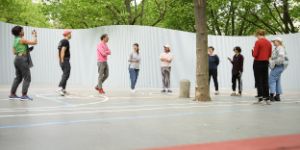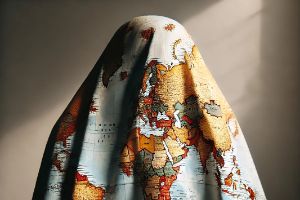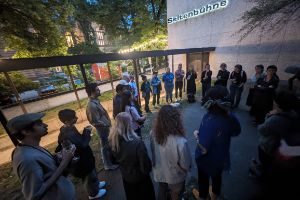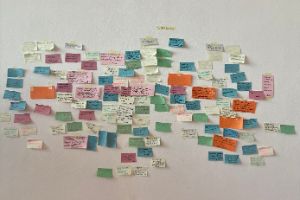
© Berliner Festspiele, photo: Fabian Schellhorn
International Forum
The International Forum is a scholarship programme for aspiring performing arts artists from across the world. It’s a platform for global exchange and the promotion of young theatre makers, an initial impetus for collaboration, the search for diverse local perspectives on global issues, and a free space for developing artistic ideas together. Artists from all continents will gather in Berlin during Theatertreffen to see shows together, think together, make connections and celebrate.
The 2026 Open Call
For its 2026 edition, the International Forum will relocate to the Floating University in Berlin’s Kreuzberg district, a rainwater collection basin built for the former Tempelhof airport, and invites around 30 theatre makers to spend two weeks doing everything they don’t usually have time for: listening, playing and thinking. Exploring and trying things out in workshops together with artists. Questioning and being questioned. Watching and discussing productions. Cooking together, eating together (and washing up together). Letting connections grow.
Applications for the 2026 International Forum are no longer possible. The selected fellows will be contacted in late February 2026.
The 2025 International Forum
More than 880 artists from 110 countries responded to the Open Call published in the autumn of 2024. The 2025 International Forum gathered 33 young theatre makers from Riga und Asunción, Ibadan and Schwedt. For this edition, the International Forum, with its co-directors Aljoscha Begrich and Sima Djabar Zadegan, moved to Uferstudios, a former tram-depot in the Berlin district of Wedding.
All the things that are impossible in transit can happen here at the depot: cleaning, maintenance, adjusting screws. A short pause for thought before the next journey. After all, everyone who stops off at the depot will have to get out at some point. What happens when theatre and art leave their habitual spaces? How does reality change theatre – and vice versa? And how can theatre itself be a means of transport; a vehicle that will carry everybody and hopefully lets its passengers exit somewhere else than where they got on? They explored these and other questions together in workshops held by artists Joana Tischkau, Wang Chong and the collective Turbo Pascal.
Furthermore, the fellows had the opportunity to attend and reflect on the festival itself: in conversations and encounters with artists involved in the productions invited to Theatertreffen, in the hotel lobby late at night and during early-morning work-outs. Non-stop theatre for two weeks, a scenic research process with no pressure to produce. And yet, insights into the worlds of these young artists were possible in the Theatertreffen-programme: During the event “The Forum’s Forum” on 17 May, the fellows gave the public a playful insight into their work.
Impressions from the International Forum
60 Years of the International Forum
Anniversary Programme 2025 with 53 Alumni

Zoom Out: A Surreal Snapshot of the World
© Created by Grover using DALL-E
For 60 years, the International Forum has been bringing theatre-makers from around the world to Berlin for two weeks. Over these six decades, the International Forum has hosted a total of 2,476 artists from 90 countries. In 2025, we celebrated the anniversary of this global space for resonance within the Theatertreffen with the special programme “Forum Theatertreffen 1965–2025”, curated by Aljoscha Begrich, Sima Djabar Zadegan and Nora Hertlein-Hull, featuring contributions from 53 alumni. Here you can gain an insight into this anniversary programme. Welcome to the Story “60 Years of the International Forum”!
Team
History
The International Forum (IF) has existed since 1965. Founded as the “Begegnung junger Bühnenangehöriger” (Meeting of Young Stage Professionals), it is the oldest institution of its kind in continuous operation. It began as an event that provided information and discussions for young professional theatre-makers from West Germany. In 1970 the circle of participants was widened when agreements were reached with institutions in Austria and Switzerland. As a result of the co-operation with the Goethe-Institut that began in 1980, young theatre-makers could be invited from all over the world.
The aim of the International Forum remains the same today: to create an open forum for early-career theatre-makers, a space that offers time and opportunities for artistic exchange, to work collaboratively, and experiment and explore theatrically – without the pressure of having to deliver a presentable product. Up until today the process of questioning and being questioned continues to have a long-lasting influence on the working methods and way of thinking of the participating artists. It is no coincidence that unique transnational and long-lasting working relationships have repeatedly evolved from the International Forum.
With the introduction of international participants, the Forum also took on a broader range of themes, focussing more strongly on socio-political issues on a local and global level in order to investigate theatre as a space for public debate located between arts, politics and society. Discourses around changing perspectives, equality, structural power imbalances and access were increasingly explored in the International Forum. This was the case even more so as the exchange between the local theatre scene and their international colleagues – especially those from countries that are out of the focus of the Western European cultural sector – called for a pluralistic view of the world and critical engagement with other points of view and forms of work that transcend the horizons of the German-speaking cultural landscape.
In the year 2000 the International Forum received the Fritz Kortner Prize, awarded by the magazine Theater heute and funded by the Friedrich Stiftung. In 2001 the International Theatre Institute (ITI Germany) awarded its prize on the World Theatre Day to the International Forum and its former director Manfred Linke.
In 2025, the 60th anniversary of the International Forum was celebrated with the artistic programme “Forum Theatertreffen 1965–2025”. It was curated by Aljoscha Begrich, Sima Djabar Zadegan and Nora Hertlein-Hull and consisted exclusively of contributions by alumni, giving an impression of the breadth of artworks created by the 2476 artists from 90 countries who have taken part – till now outside the public eye – in the International Forum.
Directors
From 1965 to 1968 the “Meeting of Young Stage Professionals” was run by Joachim Werner Preuß, in the period from 1969 to 2005 as the “International Forum for Young Stage Professionals” it was run by Manfred Linke. From 2006 to 2014 the International Forum was run by Uwe Gössel, from 2015 to 2017 by Daniel Richter and from 2018 to 2022 by Necati Öziri. In 2023 the International Forum became part of the “10 Treffen”. In 2024, Aljoscha Begrich and Sima Djabar Zadegan took over as its directors.
Participants
Since 1965, more than 2500 theatre-makers from 90 countries have been awarded scholarships to participate in the IF.
The International Forum takes place in co-operation with the Goethe-Institut, the Swiss Cultural Foundation Pro Helvetia and the Kultur | lx – Arts Council Luxembourg. It is supported by the German Stage Association.
Theatertreffen is funded by
Funded by
The International Forum is realised in cooperation with
|
|
|
|
|
|
|
|
The 2025 International Forum was realised thanks to the support of our partners:
|
|
|

|
|
|
|
|
|
 |













